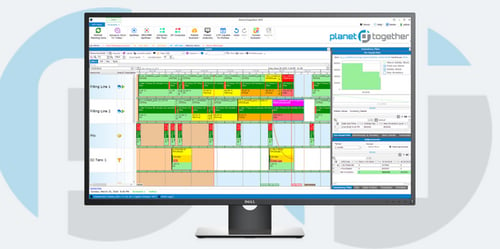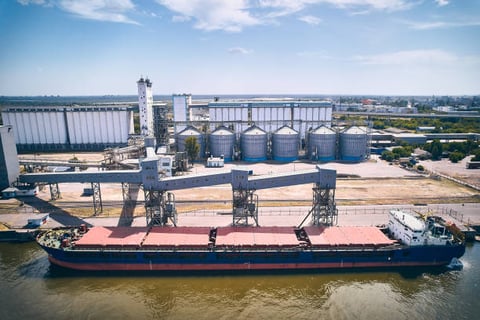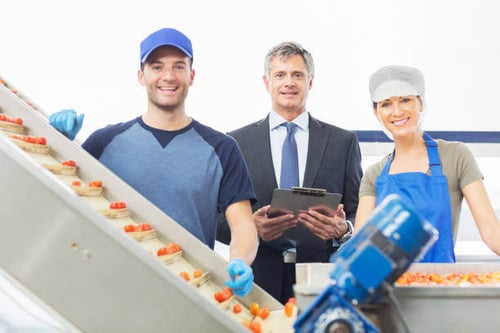Dealing with Tariff Changes: A Strategic Approach for Food & Beverage Plant Managers
The food and beverage manufacturing industry is no stranger to global trade disruptions. Tariff changes—whether due to trade wars, geopolitical shifts, or regulatory updates—can significantly impact costs, supplier relationships, and overall production efficiency. As a Plant Manager in this sector, understanding how to navigate these changes is critical for maintaining cost-effectiveness, ensuring compliance, and optimizing production planning.
Advanced planning and scheduling (APS) tools like PlanetTogether, when integrated with ERP systems such as SAP, Oracle, Microsoft Dynamics, Kinaxis, or Aveva, offer a powerful solution to mitigate the impact of tariff fluctuations.
This blog explores strategic ways to manage tariff changes effectively, leveraging technology to maintain efficiency and competitiveness.

The Impact of Tariff Changes on Food & Beverage Manufacturing
Tariffs impose additional costs on raw materials, packaging, and imported ingredients, directly affecting the bottom line of food and beverage manufacturers. These changes can result in:
Increased production costs due to higher material expenses
Disruptions in supply chain logistics
Shift in supplier dynamics as companies seek alternative sourcing options
Fluctuating consumer prices and demand
Compliance challenges with evolving trade policies
To address these challenges, food and beverage plant managers need a proactive approach supported by technology-driven solutions.

Leveraging PlanetTogether APS and ERP Integration for Tariff Adaptability
Advanced planning and scheduling (APS) tools like PlanetTogether offer dynamic capabilities to help manufacturers deal with tariff changes. When integrated with ERP systems such as SAP, Oracle, Microsoft, Kinaxis, or Aveva, plant managers can gain real-time visibility into supply chain costs, optimize scheduling, and make data-driven decisions to counteract tariff-related disruptions.
Here’s how:
Scenario Planning for Cost Variability
With APS-ERP integration, plant managers can simulate multiple tariff scenarios and their impact on production costs. For example, if an imported ingredient faces a tariff hike, PlanetTogether’s scenario planning feature—when linked with SAP or Oracle—can analyze cost fluctuations, allowing managers to compare sourcing alternatives and production schedules in real time.
Optimized Supplier Selection
When tariffs affect the cost-effectiveness of existing suppliers, APS tools can help evaluate alternative sources. By integrating PlanetTogether with ERP systems like Microsoft Dynamics or Kinaxis, plant managers can access supplier performance metrics, transportation costs, and lead times to make informed procurement decisions.
Dynamic Scheduling Adjustments
Tariffs can impact delivery timelines and availability of raw materials. With PlanetTogether’s APS functionality integrated into Aveva or SAP, plant managers can dynamically adjust schedules based on real-time supply chain updates. This ensures minimal disruptions to production while maximizing resource utilization.
Cost Tracking and Budget Alignment
An increase in import duties or new tariff regulations demands accurate cost tracking. Integration between PlanetTogether and ERP systems such as Oracle or Microsoft Dynamics provides a centralized platform for tracking tariff-related costs and aligning them with budget forecasts. This helps plant managers make cost-conscious production adjustments without compromising quality.
Automation for Regulatory Compliance
Changes in tariffs often come with new compliance requirements. By integrating PlanetTogether APS tools with ERP systems like Kinaxis, food and beverage manufacturers can automate compliance checks, generate necessary documentation, and ensure adherence to trade regulations without manual intervention.
Case Study: A Food & Beverage Manufacturer Navigating Tariff Changes
Consider a beverage manufacturer that imports citrus ingredients from multiple countries. A sudden increase in import duties on citrus fruits from a key supplier nation threatens to raise costs significantly.
By leveraging PlanetTogether’s APS platform integrated with SAP:
The manufacturer runs a scenario analysis comparing the cost of continuing with the current supplier versus shifting to an alternative source.
The system identifies an alternative supplier with competitive pricing, even with increased transportation costs.
Dynamic scheduling adjustments ensure that existing raw material stocks are utilized efficiently while transitioning to the new supplier.
Budget forecasting tools within SAP reflect the revised cost structure, allowing proactive financial planning.
Automated compliance features ensure that the manufacturer adheres to the new tariff regulations seamlessly.
Through this approach, the manufacturer mitigates cost increases while maintaining production efficiency and product quality.

Future-Proofing Against Tariff Volatility
While tariff changes can be unpredictable, food and beverage manufacturers can take steps to build long-term resilience:
Diversify supplier networks to reduce dependence on a single country or region.
Invest in supply chain visibility through ERP-APS integration for real-time tracking of cost fluctuations.
Adopt AI-driven forecasting tools to anticipate tariff trends and adjust procurement strategies accordingly.
Leverage trade agreements and incentives to take advantage of lower tariffs in certain markets.
Automate compliance processes to reduce the burden of adapting to new trade policies.
Managing tariff changes effectively requires a combination of strategic planning, supply chain agility, and technological support. By integrating PlanetTogether APS with ERP solutions such as SAP, Oracle, Microsoft Dynamics, Kinaxis, or Aveva, food and beverage plant managers can gain the visibility, flexibility, and automation needed to minimize disruption and optimize production costs.
With the right approach, manufacturers can turn tariff challenges into opportunities for operational efficiency and competitive advantage. The key lies in leveraging data-driven insights and integrating smart technologies to stay ahead in an ever-evolving trade landscape.
Are you ready to take your manufacturing operations to the next level? Contact us today to learn more about how PlanetTogether can help you achieve your goals and drive success in your industry.
Topics: PlanetTogether Software, Integrating PlanetTogether, Food and Beverage Manufacturing, Scenario Planning for Cost Variability, Optimized Supplier Selection, Cost Tracking and Budget Alignment





















LEAVE A COMMENT